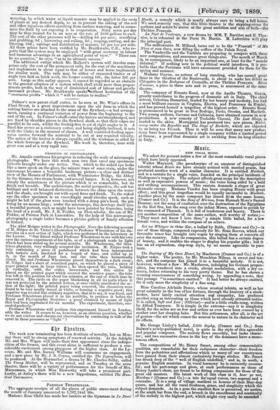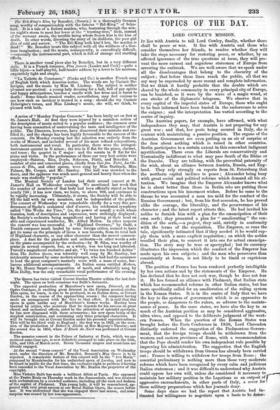NEW VOCAL MUSIC.
We select for present notice a few of the most remarkable vocal pieces which have lately appeared.
Walter Maynard, (the psendonyme of an amateur of distinguished talents) whose Rizzio we have already noticed with merited praise, has produced another work of a similar character. It is entitled Macbeth, and is a cantata for a single voice, founded on the principal incidents of Shakspeare's tragedy. The subject affords great scope for the descriptive as well as expressive powers of music ; the voice being aided by a bold and striking accompaniment. This cantata demands a singer of great dramatic energy. Madame Viardot has been singing Rizzio with great effect ; and this great tragedian would be equally successful in Macbeth. Another piece by the same composer has issued frc m the same house, (Cramer and Co.) It is the Song of Miriam, from Hannah More's Sacred Dramas not the song of exultation over the destruction of the Egyptians in the B:ed Sea, but the song over the infant Moses, exposed to perish by the command of Pharaoh. It is full of tenderness and beauty. There is yet another composition of the same author, well worthy of notice ;— " They must not know I love thee," a simple little ballad, for a low female voice, and within the compass of an octave.
_Let me Whisper in thine Ear, a ballad by Balfe, (Cramer and Co.)—is one of those things, composed expressly for Mr. Sims Reeves, which our favourite tenor has brought into vogue by singing them at concerts all over the country. Like its companions, this ballad has a certain degree of beauty, and it enables the singer to display his popular gifts ; but it has an ad captandum, clap-trap style, by no means agreeable to pure taste.
The Beating of My Own Heart, by Macfarren (Cramer and Co.) is of a higher order. The poetry, by Mr. Monckton Wins, is sweet and ten- der, and the composer has joined it to a beautiful melody. It is not, however, without a flaw : Mr. Macfarren, indulging his German propen- sities, has wandered into a crude, abrupt modulation, with a dry ca- denza, before returning to his very pretty theme. But he has shown a seeming consciousness of something wrong, by appending a note, that this passage "is sometimes omitted." It had better be always omitted, for it only mars the simplicity of a fine song.
Miss Caroline Adelaide Dance, whose musical talents, as well as her great calamity in the loss of her fortune, through the knavery of a stock- broker, have lately excited attention azsd sympathy, has produced another song as interesting as those which have already attracted notice. It is called, Soft and Low ; (011ivier)—and is a little cradle-song, written by Alfred Tennyson. It is simple in the extreme—nay it is simplicity itself, for the notes are as few and artless as ever have been crooned by a mother over her sleeping babe. But this artlessness, after all, is the art of genius—the art which comes the nearest to nature in its character and its effects.
Mr. George Linley's ballad, _Little Sophy, (Cramer and Co.,) from Bulwar's newly-published novel, is quite in the style of this agreeable and popular composer. The melody flows smoothly, but lacks charac- thr ; and two successive closes in the key of the dominant have a mono- tonous effect.
The compositions of Mr. Henry Smart, among other commendable qualities, are remarkable for their indigenous character—their freedom from the pedantries and affectations which so many. of our countrymen have gained from their almost exclusively foreign studies. Mr. Smart has drunk deep of the "well of English undefiled," and is, in sooth, a genuine English musician. In vocal harmony he is eminently success- ; and his part-songs and glees, at such performances as those of Henry Leslie's choir, are found to be fitting companions for those of the great old masters. His latest work of this class is 0, hear ye not, Maidens ? (Cramer and Co.)—a trio for equal voices, two soprani and a contralto. It is a song of village maidens in honour of their May-day queen, and has all the rural freshness, grace, and simplicity which the subject demands. As in a gem the smallest flaw is perceived, we notice, at the ninth bar from the end, a breach in the smoothness and continuity of the melody in the highest part, which might very easily be amended The En-King's Irks, by Benedict, (Boosey,) is a thoroughly German song, worthy of companionship with the famous " Erl-King" of Schu- bert. It is a tale of a forlorn maiden, who, hastening through the win- ter night's storm to meet her lover at the " trysting-tree," finds, instead of the recreant swain the terrible being whose frozen kiss is the kiss of death. In other words, divesting the story of its diablerie' the poor girl dies of cold and sorrow. "The Erl-King bath kiss'd her, the maiden is dead !" Mr. Benedict treats this subject with all the wildness of a Ger- man imagination ; and the music, consequently, is exceedingly difficult, —especially the instrumental part, which is full of strange and startling effects.
There is another vocal piece also by Benedict, but in a very different style. It is a French romance Plus Jamas (Leader and Cock)—quite a little bijou—a half-playful, half-tender address by a lover to his mistress, exquisitely light and simple.
"La Toilette de Constance," (Cocks and Co.) is another French song of English birth which deserves notice. The words are by Casimir De- lavigne, and the music by Miss M. Lindsay. The subject is neither pleasant nor poetical: a young lady dressing for a ball, full of gay spirits and happy anticipations, touches a candle with her dress and is burnt to death ! Some female musical reader, nevertheless, may feel curious to see how such an incident is treated in a song : should she try Casimir Delavigne's verses, and Miss Lindsay's music, she will, we think, be • pleased with both.



































 Previous page
Previous page